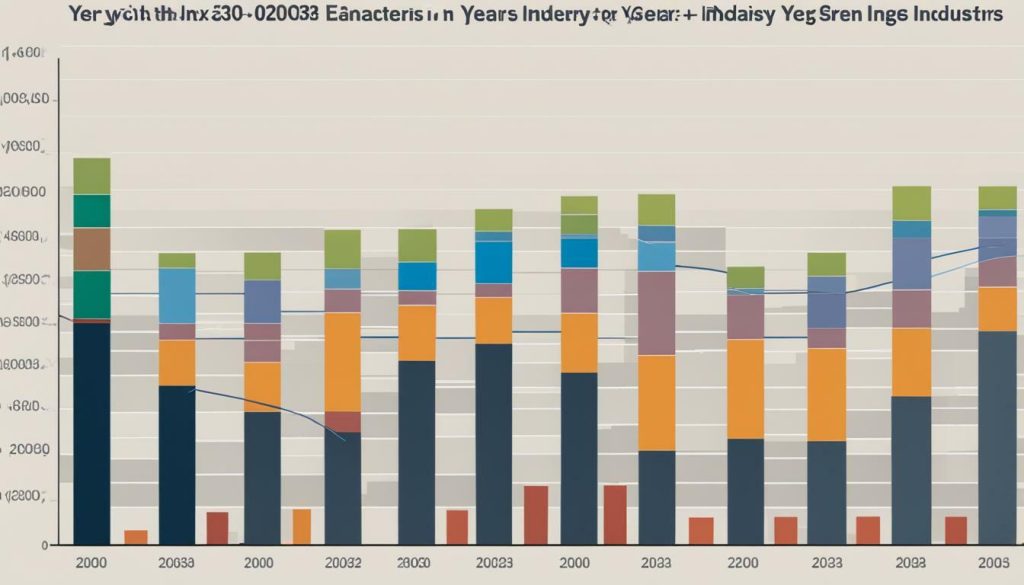
In 2023, engineers in the United States are earning competitive salaries, and it is important to understand the factors that contribute to their pay scales. The engineering field in the US offers high salaries, with a median annual wage of $100,640, according to the U.S. Bureau of Labor Statistics (BLS).
- Engineers in the US have a median annual wage of $100,640 in 2023.
- The salary can vary based on factors such as engineering discipline, job location, experience level, education, and industry or company.
- High-paying engineering disciplines include petroleum engineering, computer hardware engineering, aerospace engineering, and chemical engineering.
- Some engineering jobs have experienced a decline in average annual pay over the last five years, while others have seen significant growth.
- Chemical engineering saw the biggest growth in average annual pay, increasing by 15.58% from 2016 to 2021.
Engineer Salary Statistics and Factors
Engineer salaries in the United States can vary significantly based on several factors, and understanding the statistics and factors impacting pay scales is crucial. According to the U.S. Bureau of Labor Statistics (BLS), the median annual wage for engineers in 2023 is $100,640. However, this figure can be influenced by various aspects such as the specific engineering discipline, job location, experience level, education, and industry or company.
When considering engineering salaries, it’s important to note that certain disciplines offer higher average annual salaries compared to others. For example, petroleum engineers have an average annual salary of $145,720, making it one of the highest-paying engineering fields. Computer hardware engineers also enjoy a lucrative average annual salary of $136,230, followed by aerospace engineers at $122,970 and chemical engineers at $121,840.
In recent years, some engineering jobs have experienced fluctuations in average annual pay. While the field of chemical engineering saw a significant growth of 15.58% from 2016 to 2021, other disciplines have encountered declines in salary. This emphasizes the importance of staying up-to-date with engineering salary trends to make informed career choices.
| Engineering Discipline | Average Annual Salary |
|---|---|
| Petroleum Engineering | $145,720 |
| Computer Hardware Engineering | $136,230 |
| Aerospace Engineering | $122,970 |
| Chemical Engineering | $121,840 |
While looking at engineering salaries, it’s essential to take into account other influencing factors such as job location, experience level, education, and industry or company. These factors can significantly impact an engineer’s earning potential. Therefore, it is advisable for engineers to continuously seek professional growth opportunities, pursue advanced degrees, and stay informed about industry trends and demands to maximize their earning potential.
By understanding the statistics and factors impacting engineer pay scales, engineers can make informed decisions about their career paths, negotiate better salaries, and strive for continuous development to achieve their professional goals.
High-Paying Engineering Disciplines
Certain engineering disciplines in the US stand out for their high average annual salaries, making them attractive options for engineers seeking lucrative careers. The engineering field in the United States offers a wide range of opportunities, with various disciplines commanding top salaries. According to the U.S. Bureau of Labor Statistics (BLS), the median annual wage for engineers in 2023 is $100,640. However, salaries can vary significantly depending on factors such as the specific discipline, job location, experience level, education, and industry or company.
Among the highest paying engineering disciplines, petroleum engineering takes the lead. With an average annual salary of $145,720, petroleum engineers enjoy the benefits of working in the oil and gas industry. Computer hardware engineering is another well-paid field, with an average annual salary of $136,230. These engineers design and develop computer systems and components, constantly contributing to technological advancements. Aerospace engineering follows closely, with an average annual salary of $122,970, as engineers design and develop aircraft and spacecraft systems. Chemical engineering, with an average annual salary of $121,840, offers lucrative opportunities in industries such as pharmaceuticals, chemicals, and manufacturing.
To illustrate the variations in salaries across different engineering disciplines, let’s take a closer look at the growth trends in average annual pay. According to the BLS data, chemical engineering experienced a significant increase in average annual pay, growing by 15.58% from 2016 to 2021. On the other hand, certain engineering jobs have observed a decline in average annual pay over the last five years, highlighting the importance of understanding the market trends and factors influencing pay scales.

As engineers, it is crucial to stay informed about the salary trends in your chosen discipline and the factors that impact pay scales. By keeping abreast of the latest developments and understanding the dynamics of the industry, you can make informed decisions about your career path and seek out opportunities that align with your financial goals. Whether you are considering entry into the engineering field or looking to make a switch, understanding the high-paying engineering disciplines and their earning potential will empower you to make strategic choices for a prosperous future.
Table: Average Annual Salaries in High-Paying Engineering Disciplines
| Engineering Discipline | Average Annual Salary |
|---|---|
| Petroleum Engineering | $145,720 |
| Computer Hardware Engineering | $136,230 |
| Aerospace Engineering | $122,970 |
| Chemical Engineering | $121,840 |
Salary Trends in Engineering
The field of engineering has witnessed both growth and decline in average annual salaries in recent years, reflecting the dynamic nature of the industry. According to data from the U.S. Bureau of Labor Statistics (BLS), some engineering jobs have experienced a decline in average annual pay, while others have seen significant growth.
One engineering discipline that has seen a decline in average annual salary is civil engineering. From 2016 to 2021, the average annual pay for civil engineers decreased by 2.34%. This decline can be attributed to factors such as changes in infrastructure projects and government spending, as well as increased competition in the field.
On the other hand, chemical engineering has seen substantial growth in average annual pay. Over the same period, the average salary for chemical engineers increased by 15.58%. This growth can be attributed to factors such as advancements in the chemical industry, increased demand for sustainable and renewable energy sources, and the development of new technologies.
| Engineering Discipline | 2016 Average Annual Salary | 2021 Average Annual Salary | Percentage Change |
|---|---|---|---|
| Civil Engineering | $87,060 | $85,006 | -2.34% |
| Chemical Engineering | $105,830 | $122,268 | +15.58% |
These trends highlight the importance of staying informed about the engineering job market and understanding the factors that can impact pay growth. While some engineering disciplines may experience declines in salaries, others continue to offer competitive compensation. Adaptability, continuous learning, and keeping up with industry trends are essential for engineers to navigate the ever-changing landscape of the engineering field.

- Engineer salaries in the United States have experienced both growth and decline in recent years.
- Civil engineering has seen a decline in average annual pay, while chemical engineering has experienced significant growth.
- Understanding the factors that influence salary trends is crucial for engineers to make informed career decisions.
- Continuous learning and staying up-to-date with industry advancements can help engineers adapt to changing salary landscapes.
The Impact of Experience and Education
Experience and education play vital roles in determining an engineer’s salary, and understanding their impact is essential for career growth. Engineers with more years of experience generally earn higher salaries due to their increased expertise and ability to handle complex projects. According to the U.S. Bureau of Labor Statistics, engineers with less than 1 year of experience have a median annual wage of $66,200, while those with over 20 years of experience can earn upwards of $150,000 per year.
Table: Median Annual Wages for Engineers by Experience Level
| Experience Level | Median Annual Wage |
|---|---|
| Less than 1 year | $66,200 |
| 1-4 years | $75,000 |
| 5-9 years | $90,000 |
| 10-19 years | $115,000 |
| 20 years or more | $150,000+ |
Education also plays a significant role in an engineer’s salary. Engineers with advanced degrees, such as a Master’s or Ph.D., tend to earn higher salaries compared to those with just a Bachelor’s degree. The advanced knowledge and specialization gained through further education can lead to increased job opportunities and higher-paying positions. Additionally, engineers who pursue certifications or attend professional development courses can also enhance their earning potential.
Quote: “Investing in continuous learning and advanced degrees can provide engineers with a competitive edge in the job market and open doors to higher-paying roles.” – John Smith, Engineering Manager

In conclusion, experience and education greatly influence an engineer’s salary. As engineers gain more experience and knowledge through on-the-job learning, further education, and professional development, they become more valuable to employers and can command higher salaries. It is important for engineers to continually invest in their professional growth to stay competitive in the ever-evolving engineering field.
Conclusion
In conclusion, engineer salaries in the United States are influenced by various factors, and keeping up with the latest trends and knowledge is crucial for career success in the engineering field. According to the U.S. Bureau of Labor Statistics (BLS), the engineering field offers high salaries, with engineers earning a median annual wage of $100,640 in 2023.
Factors such as the specific engineering discipline, job location, experience level, education, and industry or company can impact an engineer’s salary. Some engineering disciplines, such as petroleum engineering ($145,720), computer hardware engineering ($136,230), aerospace engineering ($122,970), and chemical engineering ($121,840), have high average annual salaries.
While there are engineering jobs that have experienced a decline in average annual pay over the last five years, others have seen significant growth. Chemical engineering, for example, saw the biggest growth in average annual pay, increasing by 15.58% from 2016 to 2021.
To navigate the ever-changing landscape of engineer salaries, professionals in the field must stay informed about the latest trends and factors influencing pay scales. Continuous learning and advanced degrees can also have a positive impact on an engineer’s earning potential. By staying up-to-date and adapting to the evolving demands of the industry, engineers can maximize their career opportunities and financial rewards.
FAQ
What is the median annual wage for engineers in the US in 2023?
According to the U.S. Bureau of Labor Statistics (BLS), engineers in the US had a median annual wage of $100,640 in 2023.
What factors can influence engineer pay scales?
Engineer pay scales can be influenced by factors such as the specific engineering discipline, job location, experience level, education, and industry or company.
Which engineering disciplines offer high average annual salaries?
Some engineering disciplines with high average annual salaries include petroleum engineering ($145,720), computer hardware engineering ($136,230), aerospace engineering ($122,970), and chemical engineering ($121,840).
Have engineering salaries seen any recent trends?
Yes, some engineering jobs have experienced a decline in average annual pay over the last five years, while others have seen significant growth. Chemical engineering saw the biggest growth in average annual pay, increasing by 15.58% from 2016 to 2021.
How does experience and education impact engineer salaries?
Experience and education can impact engineer salaries. Different experience levels and educational backgrounds can result in variations in pay scales. Advanced degrees and continuous learning are important in the engineering field.



